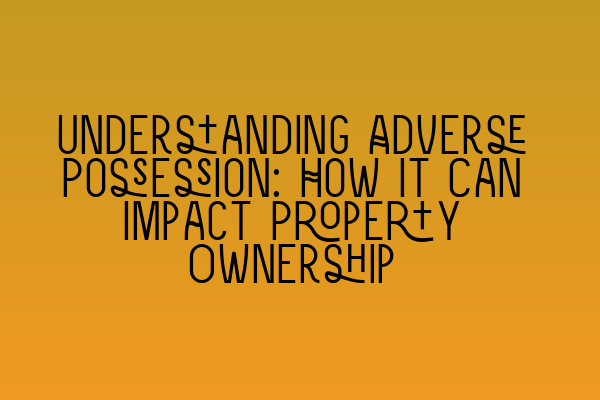Understanding Adverse Possession: How It Can Impact Property Ownership
When it comes to property ownership, there are various legal concepts and issues that need to be understood. One such concept is adverse possession, which can have a significant impact on property ownership. In this article, we will explore what adverse possession is, how it works, and its implications in property law.
But before we delve into the details, it’s important to note that property laws and regulations can change over time. It’s always a good idea to stay updated with the latest developments in UK property laws. You can find more information on the Updates in UK Property Laws: Key Changes and Implications article.
What is Adverse Possession?
Adverse possession is a legal principle that allows a person to claim ownership of another person’s property by occupying and using it for a certain period of time. It is often referred to as “squatter’s rights” or “adverse possession laws.”
In order for adverse possession to be established, certain conditions must be met. These conditions typically include:
- Actual possession: The person claiming adverse possession must physically occupy and use the property in question.
- Open and notorious possession: The possession must be visible and obvious, without any attempt to hide it.
- Hostile possession: The possession must be against the rights of the true owner, without permission or consent.
- Continuous possession: The occupation and use of the property must be uninterrupted for a specified period of time.
- Exclusive possession: The possession must be exclusive and not shared with the true owner or anyone else.
It’s worth mentioning that the required period of occupation for adverse possession varies depending on the jurisdiction. In England and Wales, for example, it is generally 10 or 12 years, while in other countries it may differ. It’s important to check the specific laws in your jurisdiction to understand the requirements.
The Implications of Adverse Possession
Adverse possession can have significant implications for property ownership. Here are a few key points to consider:
- Loss of ownership: If someone successfully claims adverse possession of your property, you could potentially lose ownership rights. This is because adverse possession can result in a transfer of ownership from the true owner to the adverse possessor.
- Defending your property: As a property owner, it is essential to be aware of any potential adverse possession claims against your property. Regularly inspecting and maintaining your property can help prevent adverse possession claims by demonstrating your active ownership and control over the property.
- Preventing adverse possession: If you are a property owner concerned about adverse possession, there are steps you can take to protect your rights. These include ensuring your property is well-maintained, actively using and occupying the property, and taking legal action against anyone trespassing on your property.
- Legal challenges: Adverse possession claims can lead to legal disputes, with both sides presenting arguments and evidence to support their claims. Understanding the legal process and seeking legal advice can be crucial in such cases. For a comprehensive guide on legal challenges in property transactions, check out Legal challenges in property transactions: A comprehensive guide.
Adverse Possession and Land Law
Adverse possession is a fundamental concept in land law, and it is often a topic that comes up in exams and assessments. Understanding adverse possession and its implications is crucial for students and professionals studying land law.
If you’re preparing for a land law exam or simply want to ace your understanding of the subject, make sure to check out our article on Land Law Revision Tips: Ace Your Exam Preparation. It provides valuable insights and tips to help you master land law concepts, including adverse possession.
Mortgages and Adverse Possession
Adverse possession can also have implications for property transactions involving mortgages. When taking out a mortgage on a property, it’s essential to consider the potential risks associated with adverse possession.
To learn more about mortgages and the essential considerations for property transactions, check out our article on Mortgages and land law: Essential considerations for property transactions.
Conclusion
Adverse possession is a complex legal concept that can have significant implications for property ownership. Understanding its principles and potential effects is crucial for property owners, students, and professionals in property and land law.
Remember to stay updated with the latest developments in property law to ensure you have the necessary knowledge to protect your property rights. Avoid common pitfalls and challenges by checking out our article on Dominate Property Law Questions: Avoiding Common Pitfalls.
